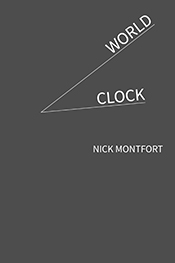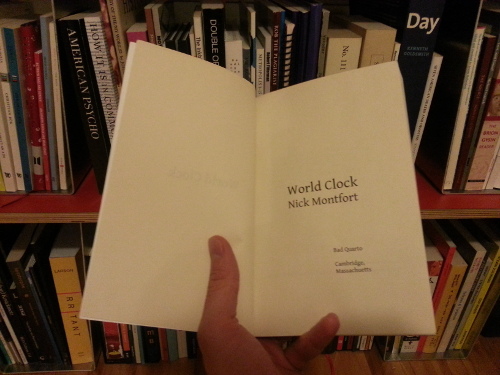Purple Blurb, MIT’s digital writing series organized by Prof. Nick Montfort of the Trope Tank, powers on, thanks to the four excellent writers/artists who will be presenting in Spring 2014. All events this semester will be held Mondays at 5:30pm in MIT’s room 14E-310.

March 10, 5:30pm in 14E-310:
Páll Thayer
Microcodes
Short Perl programs that are also artworks, presented for viewers to read, download, and execute. Thayer will trace some key steps showing how he went from his background in painting and drawing to presenting code as his artwork.
Páll Thayer is an Icelandic artist working primarily with computers and the Internet. He is devout follower of open-source culture. His work is developed using open-source tools and source-code for his projects is always released under a GPL license. His work has been exhibited at galleries and festivals around the world with solo shows in Iceland, Sweden and New York and notable group shows in the US, Canada, Finland, Germany and Brazil (to name but a few). Pall Thayer has an MFA degree in visual arts from Concordia University in Montreal. He is an active member of Lorna, Iceland’s only organization devoted to electronic arts. He is also an alumni member of The Institute for Everyday Life, Concordia/Hexagram, Montreal. Pall Thayer currently works as a lecturer and technical support specialist at SUNY Purchase College, New York.
April 7, 5:30pm in 14E-310:
Lance Olsen
Experimental writing & video
Including a reading from his recent book _[[ there. ]]_ and video from his _Theories of Forgetting_ project.
Lance Olsen is author of more than 20 books of and about innovative writing, including two appearing this spring: the novel based on Robert Smithson’s earthwork the _Spiral Jetty, Theories of Forgetting_ (accompanied by a short experimental film made by one of its characters), and _[[ there. ]],_ a trash-diary meditation on the confluence of travel, curiosity, and experimental writing practices. His short stories, essays, and reviews have appeared in hundreds of journals and anthologies. A Guggenheim, Berlin Prize, N.E.A. Fellowship, and Pushcart Prize recipient, as well as a Fulbright Scholar, he teaches experimental theory and practice at the University of Utah.
April 28, 5:30pm in 14E-310:
Scott Rettberg
Videos & combinatory videos
Produced in collaboration with Roderick Coover, Nick Montfort, and others, including: _The Last Volcano, Cats and Rats, Three Rails Live and Toxicity._
Scott Rettberg is Professor of Digital Culture in the department of Linguistic, Literary, and Aesthetic studies at the University of Bergen, Norway. Rettberg is the project leader of ELMCIP (Electronic Literature as a Model of Creativity and Innovation in Practice), a HERA-funded collaborative research project, and a founder of the Electronic Literature Organization. Rettberg is the author or coauthor of novel-length works of electronic literature, combinatory poetry, and films including _The Unknown, Kind of Blue, Implementation, Frequency, Three Rails Live, Toxicity_ and others. His creative work has been exhibited online and at art venues including the Chemical Heritage Foundation Museum, Palazzo dell Arti Napoli, Beall Center, the Slought Foundation, The Krannert Art Museum, and elsewhere.
May 5, 5:30pm in 14E-310:
Jill Walker Rettberg
Selfies
With examples from her own work as well as from photobooths, older self-portraits, and entries from others’ diaries, in her talk “Seeing Ourselves Through Technology: How We Use Selfies, Blogs and Wearable Devices to Understand Ourselves.”
Jill Walker Rettberg is Professor of Digital Culture at the University of Bergen in Norway. Her research centers on how we tell stories online, and she has published on electronic literature, digital art, blogging, games and selfies. She has written a research blog, jilltxt.net, since October 2000, and co-wrote the first academic paper on blogs in 2002. Her book _Blogging_ was published in a second edition in 2014. In 2008 she co-edited an anthology of scholarly articles on _World of Warcraft._ Jill is currently writing a book on technologically mediated self-representations, from blogs and selfies to automated diaries and visualisations of data from wearable devices.
 … is today’s comic.
… is today’s comic.









